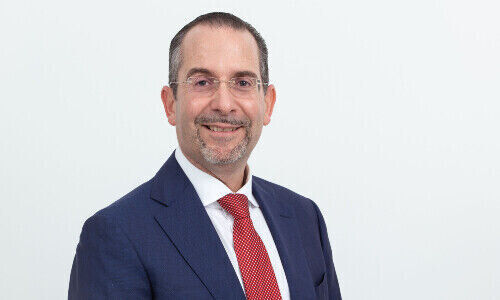Lionel Messi and Cristiano Ronaldo in the same team. Football fans would be in rapture – but the coach? Not so much. Getting Ronaldo to service a Messi would be a very tall order (the same in reverse might prove easier). But that's exactly how UBS CEO Sergio Ermotti intends to implement bank strategy, Swiss finance professor Teodoro Cocca writes in a piece for finews.com.
Sergio Ermotti emphasized a very particular point when asked by an analyst during the quarterly results presentation on Tuesday about how Switzerland's largest bank intends to reach its ambitious targets. According to him, the decisive question is how the investment banking business will help to add value to the wealth management business.
A relatively clear picture emerges if you link that pointed analysis to the precise growth ambitions disclosed for each business. Although the bank doesn't only want to gain scope and size in the US, it does want to focus growth there in the business with wealthy private clients and large institutional clients.
Clear Language
To do that, the bank will have to strongly expand investment banking in the US. The targets for its earnings in that business speak a clear language. UBS will be more America-heavy at the end of its current strategy cycle (2024-2028) than it is now.
That is reasonable from a strategic viewpoint. The country is highly attractive given its very dynamic growth rates. On top of that, UBS is well prepared to expand there against large Wall Street competitors given it has since integrated Credit Suisse's activities there. The structure of the bank is now also largely similar to that of American peers. Another fair point that has to be included in that rationale is that UBS had high growth ambitions in the US before the Credit Suisse rescue.
Fickle Winds
A big downer to any US-heavy growth strategy is that the business is not very profitable given the very high competition in the North American market. That clearly shows up in the anything-but-stellar cost-income ratios the US business has over the entire cycle.
In banker lingo, that means that top-line growth can be strong (mainly assets under management) but the positive impact on the bottom line is not very clear. That makes cost control and risk management in those businesses key. Just a fickle change in wind direction or a management mistake could upend any business plan.
On Same Wavelength
The only thing that differentiates UBS from its US peers is its Swiss wealth management culture. Something that tends towards a more long-term approach, close client relationships, and a comprehensive product offering. That kind of wealth management has not really been part of the DNA of American investment houses but they are catching up.
But how do you get the differing cultures of investment banking and wealth management to integrate so that they don't just leave each other alone, but are on the same wavelength with clients? In football, it would mean that Lionel Messi and Cristiano Ronaldo would have to stop behaving like divas, become team players, and play more defense.
Locker Room Morale
As CEO, Ermotti is going to have to be very skillful to get investment and private bankers to work together effectively. Part of that is going to be managing morale in the locker room. What will be decisive in that respect will be questions related to the bonus pool, senior management appointments, and prioritizing earnings against risk-weighted capital in the different businesses together with planned client transactions.
UBS's investment bankers are not going to be in a position to do as many deals as their American counterparts. How will management keep the lid on the possible frustration, particularly when that shrinks the bonus pool for investment bankers?
Sergio Ermotti – «The Special One»?
In football terms, a team with Ronaldo and Messi in their strike formation needs a coach like José Mourinho, who is better known for a more defensive approach. Sergio Ermotti will have to strengthen the defensive characteristics of his side, or he will be met by loud whistling from a Swiss public muss if the team makes any mistakes.
A star ensemble that has good defense wins the Champions League, as Mourinho has shown many times. If Ermotti manages that in banking, he could end up being rightfully called «the special one».
Teodoro D. Cocca has been Professor of Asset and Wealth Management at Johannes Kepler University Linz since 2006. Before that, he worked for several years at Citibank in both investment and private banking, conducting research at the Stern School of Business in New York, while teaching at the Swiss Banking Institute in Zurich. In addition, Cocca, a Swiss citizen with Italian roots, is an associate professor of private banking at the Swiss Finance Institute (SFI) in Zurich, acting as a consultant for financial companies and public authorities in Switzerland and abroad.



































